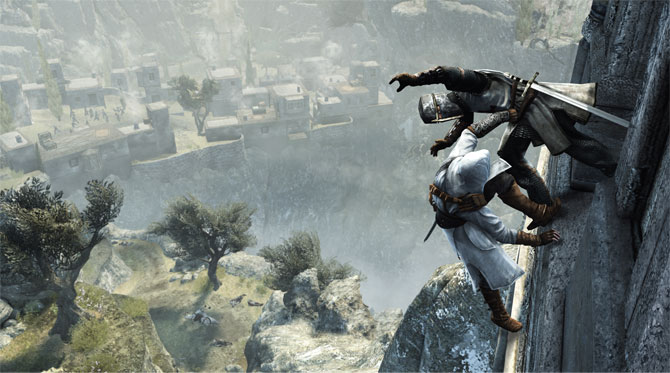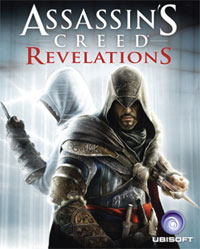

Publisher: Ubisoft Assassin’s Creed: Revelations is an aging, decrepit continuation of a once-captivating franchise, which is sort of appropriate given that it’s about the aging of its two historical protagonists, Ezio Auditore da Firenze and Altaïr ibn-La’Ahad. But the obvious joke is facile here, because I’d love to see a well-done game about old age and legacies—that this is old, tired gameplay about old, tired men is just an unfortunate coincidence. The first Assassin’s Creed was, I will contend forever, a brilliant construction, albeit flawed in a lot of ways—repetitive and too free with unskippable cut scenes of two guys talking at a desk. Assassin’s Creed II was far less narratively ambitious—rather than cultic indoctrination and philosophy, a plot seldom seen in this medium, it was about an angry young man’s quest for revenge, a plot seen all the time—but far more successful as a compelling video game. Assassin’s Creed: Brotherhood was just Assassin’s Creed II all over again, but more polished and featuring Rome, and that was fine because calling down remote assassin strikes on dudes is great, and Ubisoft succeeded in making Rome a vital setting and a character all its own. And now we have Revelations, and it’s like Brotherhood all over again except it doesn’t work. Its setting, Constantinople, has none of the character that made Renaissance Florence, Venice, and Rome from ACII and Brotherhood compelling—here we have Roma dancers filling the role of courtesans, and everyone and everything is dressed in brighter and more vivid colors than the previous games, but there’s no sense of Constantinople’s historical weight. There are three major mechanical additions to Revelations: 1) a tower-defense game for defending your territory against Templar conquerors, 2) the hookblade, which lets you jump slightly further and use zip lines, and 3) bombs. The tower-defense game, first of all, I did not find terribly entertaining, and while ACII and Brotherhood justified Ezio’s new gadgets via Leonardo da Vinci, feeding into the whole Renaissance vibe, the hookblade is just a random game power-up. Bombs sort of work, in that they provide an excuse for having an inventory—you get slots for lethal, tactical, and distraction bombs and can build different types of each out of components you buy or find in chests or on dead guys—but I never found them integrating naturally into my play style. Finally, the game lets Ezio go back and experience Altaïr’s memories during a few specific sequences. These aren’t bad, but they’re not enough to make the rest of the game interesting, and I personally found them difficult to engage with because I am a huge fan of the first Assassin’s Creed and they changed Altaïr’s voice actor. It’s true that Philip Shahbaz, Altaïr’s original performer, sounded American, while Cas Anvar has a Middle Eastern accent, which many fans clamored for. But Shahbaz conveyed a frightening intensity—Altaïr came across as a man coldly determined to succeed at everything that interested him, including the logical and philosophical problems his mentor posed to him as distractions. Anvar’s performance doesn’t convey that. Any points the game wins with me by including Altaïr again, it immediately loses because its version of Altaïr doesn’t possess any of the qualities that made the character interesting. Is it worth playing? Probably, yeah. The parkour is still great. Is it satisfying? Given the choice between playing this and going back to play Brotherhood for a third time, I’d go with Brotherhood. This review is based on a retail copy of the Xbox 360 version of Assassin’s Creed: Revelations, provided by Ubisoft for promotional purposes.